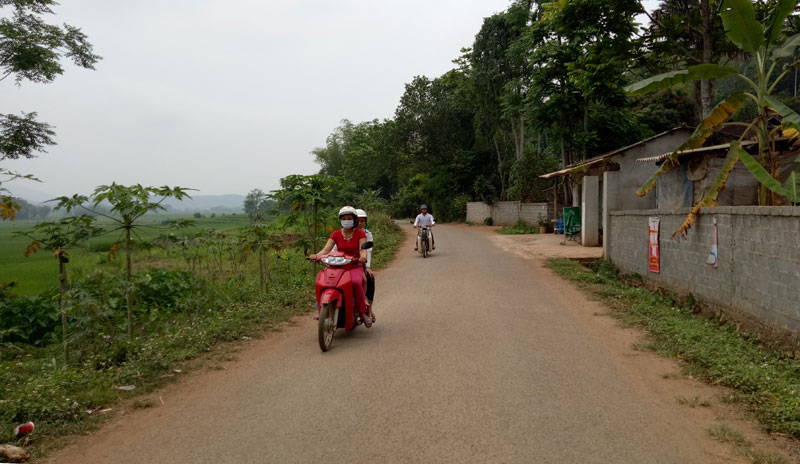
(HBO) – In recent years, Ky Son district has concentrated on maximum resources to develop rural transport, and considered it as a key task of hunger eradication and poverty alleviation. Therefore, the rural transportation network of district has developed comprehensively.

The rural road network of Ky Son district was
invested relatively, and meeting the demand of travelling and exchanging goods
of local people.
In recently, Ky Son district has focused all
resources on investing in the construction of rural transport infrastructures
with the aim of concreting and completing bridges and roads systems linking
communes and towns in order to meet the needs of travelling and promote
economic, cultural and social development. Hence, many places have successfully
implemented the movement of building rural transport infrastructures, which
made the appearance of countryside to get better. Ky Son district currently has
244.45 km of road, particularly in 12 km of asphalt road, 68.9 km of paved
roads, 86.1 km of cement concrete road, 69.14 km of grading road and 8.31 km of
dirt path. The district has four communes meeting the second criteria of
traffic such as Hop Thinh, Mong Hoa, Hop Thanh and Dan Hoa. Three communes of
Phuc Tien, Dan Ha and Phu Minh meet three quotas of the second criteria, and
two communes meet two quotas of the second criteria such as Doc Lap and Yen
Quang.
Every year, the district spends capitals of
over three billion VND on developing rural transportation. For the bridges and
undergrounds, in recent years, Ky Son district has gradually invested on
upgrading in order to serve the needs of travelling, and basically to ensure
technique and safety. At the same time, the district launched the
implementation of the campaign "All people participate in building rural
roads”. Accordingly, the communes mobilized workers to renovate and upgrade
some roads, clear bushes, clear sewers, and embank land to build rural traffic
roads. Also, they should maintain, repair and look after some district, commune
and hamlet roads.
Mr. Hoang Van Minh, Vice Chairman of Ky Son
District People's Committee, said: "Completing the rural traffic system is a
desire and aspiration of the people. Therefore, when there were guidelines and
policies of building roads, people were enthusiastic, willing to donate land
and contributing their working day to complete roads on schedule and to the
highest quality”.
More than just an information technology teacher, Bui Van Nien is an inspiring figure who has nurtured the scientific curiosity and creative spirit of students in Vietnam’s ethnic minority communities.
Da Bac is the most disadvantaged mountainous district in Hoa Binh province, with ethnic minorities accounting for about 90% of its population. Over the past years, the district has mobilised resources to implement ethnic policies to improve the quality of life of local people.
In recent years, Hoa Binh province has consistently prioritised the protection, care, and education of children, particularly those from ethnic minorities and disadvantaged backgrounds, by creating a safe, healthy, and nurturing environment for their all-round development.
The Steering Committee for Tobacco Harm Prevention and Control of Hoa Binh province, in coordination with the Tobacco Harm Prevention and Control Fund, held a ceremony on May 28 in response to the World No Tobacco Day (May 31) and the National No Tobacco Week (from May 25 to 31). The event was chaired by Nguyen Van Toan, Standing Vice Chairman of the provincial People’s Committee and head of the Steering Committee.
Since 2021, the Center for Industrial Promotion and Industrial Development Consulting (CIIDC) under the Department of Industry and Trade has been implementing a school lighting model as part of the plan for using energy efficiently and economically in Hoa Binh Province in the pẻiod of 2021 - 2025. This model not only aims to improve the learning conditions and enhance the education quality, but it also promotes the message of energy saving, energy security, environmental protection and contributes to the goals of socio-economic development.
In the 2024 - 2025 school year, the entire Hoa Binh provincial education sector includes 520 educational institutions and schools. Among them are 13 ethnic boarding schools with 153 classes and 4,487 students. Four of these schools have met national standards, reaching 30.7 percent.



